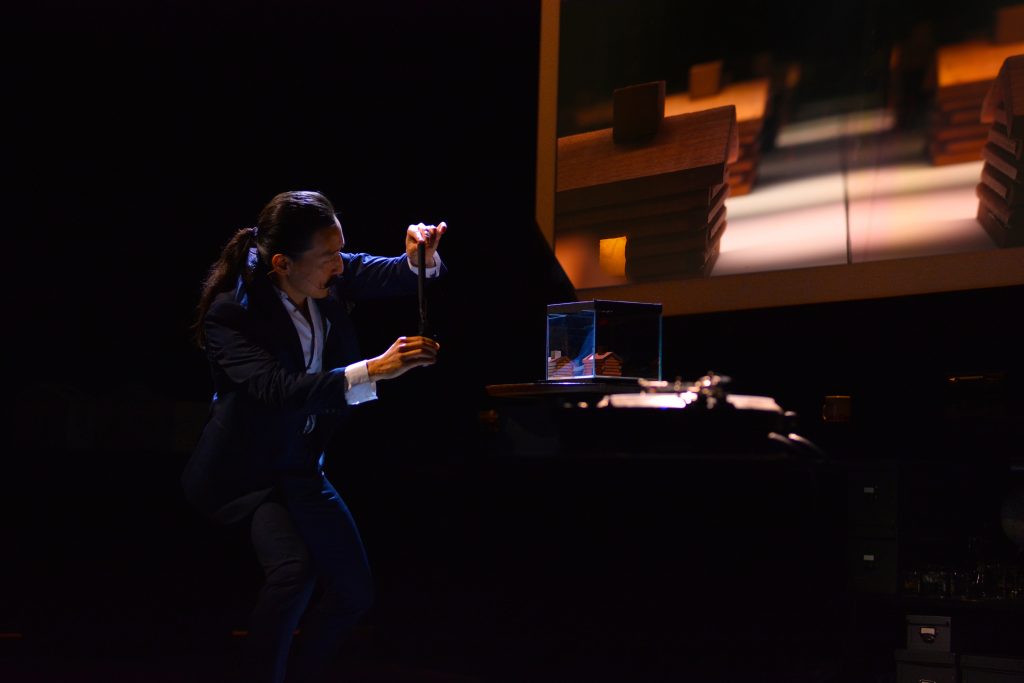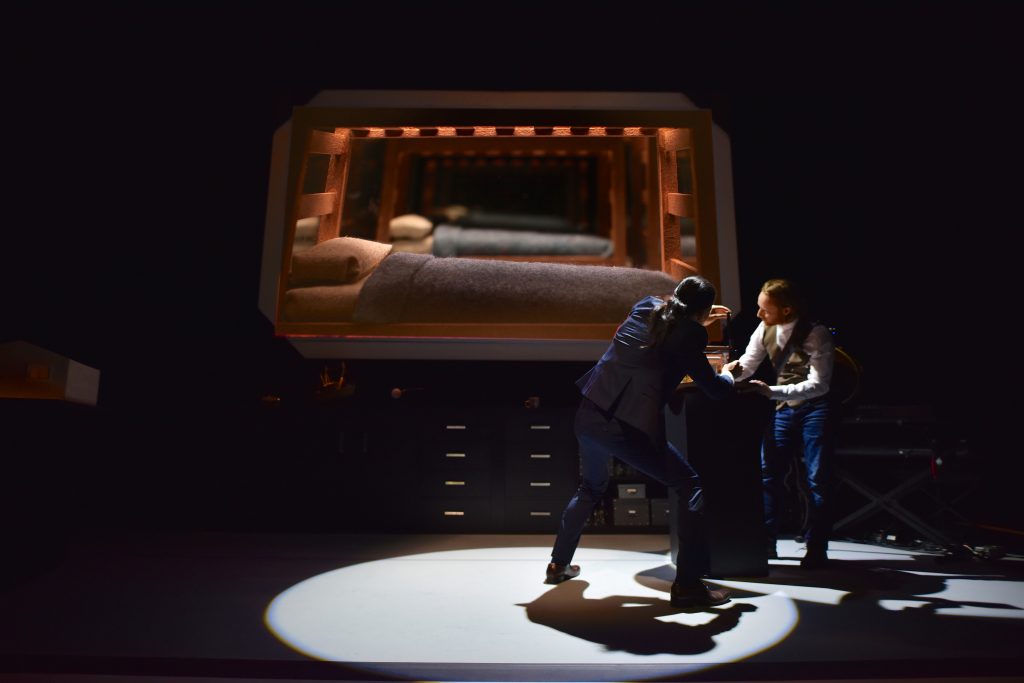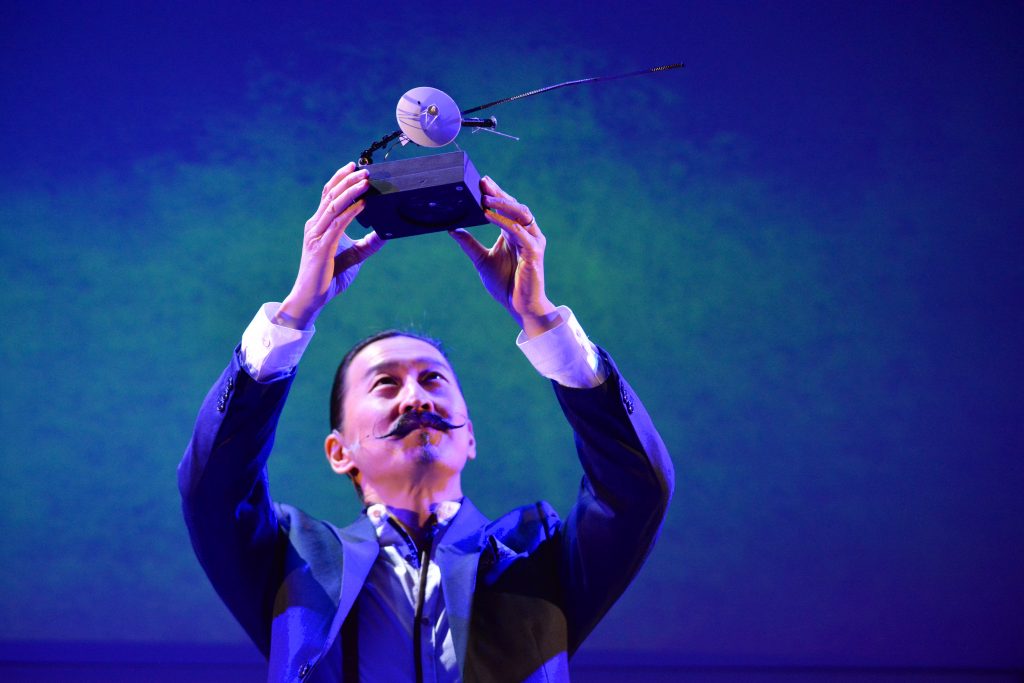
Credit: Ray Shum
At The Cultch until October 15, 2017
Tickets from $22 at thecultch.com/604-251-1363
Posted October 7, 2017
“Whenever you move into someone’s house, no matter how clean they leave it for you, they can’t help but leave behind so many clues,” says playwright/performer Tetsuro Shigematsu.
The clue that the previous resident left was a white mug bearing bold red letters: “JAPAN CAMERA”. That previous resident was Shigematsu’s friend Donna Yamamoto, actor and artistic producer of VACT (Vancouver Asian-Canadian Theatre).
Shigematsu, a former CBC broadcaster, has a journalist’s curiosity. Why the “JAPAN CAMERA” mug, he asked Donna. The story that unfolded is that of Mas Yamamoto, Donna’s father, whose life was put on hold when, as a teenager, he was removed from the coast along with thousands of other Japanese-Canadians after the bombing of Pearl Harbour.
1 Hour Photo tells us how Mas Yamamoto survived the Lemon Creek internment camp and through sheer determination and a good sense of humour, eventually thrived. After various jobs in far-flung locations he took over the franchise of JAPAN CAMERA in Capilano Mall, one of the first 1 Hour Photo labs in Canada.

Credit: Ray Shum
Thirty hours of recorded conversations between Mas Yamamoto and Shigematsu were edited down to eighteen minutes and a vinyl record was pressed. This recording is the centerpiece of 1 Hour Photo. We hear Mas’s voice and through the recording, we feel we know him – his chuckle, quiet charm, wry sense of humour, self-deprecation and gentlemanliness. Most of all we admire his ability to transform himself again and again – always with good grace and, amazingly, not a hint of bitterness against the Canadian government’s treatment of the Japanese-Canadians.
As he did in his 2015 hit Empire of the Son, Shigematsu uses mockups, photos, videos and a tiny camera to enhance the story. At stage right is a small white replica of the house at 665 Royal Road. Into the little kitchen, Shigematsu places a very tiny table, a miniature microphone and two tiny chairs; then he lowers a camera into the space. As if by magic, life-size images appear projected on a screen. Later, a single tiny bunk bed is placed in a small mirror box; circling the box with a camera, Shigematsu multiplies the bunk bed hundreds of times to illustrate the cramped dormitories that held the Japanese-Canadian men and boys at Hastings Park before they were shipped out.

Credit: Ray Shum
Although the play is ostensibly about Mas Yamamoto, central to it all is Shigematsu himself: stylish with his signature waxed mustache, sleek ponytail, skinny pants and good shoes. He charms us with his storytelling and his playfulness. Integral to the story is composer/musician Steve Charles who appears onstage and interacts with Shigematsu.
There’s a lot packed into seventy-five minutes: the internment, the DEW line, the Indian Act and more. Shigematsu’s own story is woven into that of the Yamamotos and there are times when it’s difficult to keep the two stories separate. In Empire of the Son, Shigematsu explored the difficult relationship he had with his father. In 1 Hour Photo he seems to have found a less-exacting father figure in Mas Yamamoto: an easy-going man, a man easy to love.
In the end, 1 Hour Photo, directed by Richard Wolfe with set design by Pam Johnson, is about love, how it sustains us and gives meaning to our lives. Mas Yamamoto never fell out of love with Midge, a teenager at Lemon Creek, who moved on, moved away, married and had children. But Mas fell in love again, married, and had children of his own. And then there’s Tetsuro Shigematsu who loves and is loved by his family. He doesn’t answer the questions he poses – “ How is one to live” and “How is one to die” – but he knows that love and family are the essential elements.

